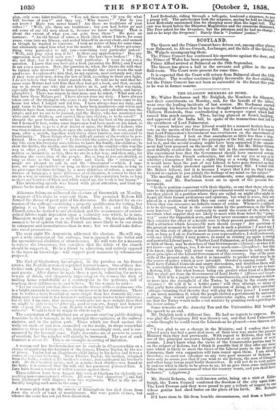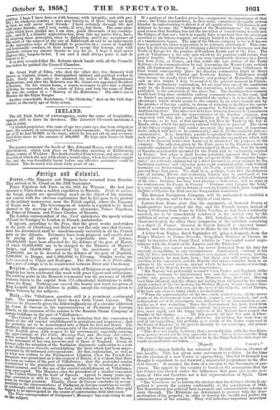THE GLASGOW MEMBERS AT HOME.
Mr. Walter Buchanan and Mr. Dalglish, the Members for Glasgow, met their constituents on Monday, and, for the benefit of the latter,
went over the leading incidents of last session. Mr. Buchanan started by assuring his hearers that he has no thought whatever of accepting the Chiltern Hundreds, thus contradicting a newspaper report which sad caused him much surprise. Then, having glanced at Scotch banking, and approved of the India bill, he spoke of the transactions that led to the overthrow of Lord Palmerston.
"I cannot believe any true Liberal would for a moment hesitate how to vote on the merits of the Conspiracy Bill. But I must say that I do regret that Lord Palmerston's Government was overthrown on the amendment of Mr. Milner Gibson. I look on that amendment as little less than a trap. The Tories had already framed the principles of the bill, and were commit- ted to it, and the second reading might have been supported if the amend- ment had been proposed on the merits of the bill ; but Mr Milner Gibson most skilfully avoided the merits of the bill in the amendment he drew. The amendment bore that the Government should have answered certain despatches from the French authorities but did not say yea or nay as to whether a Conspiracy Bill was a righething or a wrong thing. I think it would have been the part of any Liberal to have gone forward on that occasion and boldly protested against the Conspiracy Bill. I voted with Mr. Milner Gibson, and it is because I regret that I did so, that I come forward to explain to you plainly the feelings of my mind on the subject."
The meeting did not relish these sentiments, some applauding, some hissing; and Mr. Buchanan went on to speak of the present Go- vernment.
"Is their position consistent with their dignity, or one that those who ad- here to the principles of constitutional government would occupy ? Not only are they placed in a position where they are called on night after night to forget all their former professions and opinions, but what is worse, they are placed in a position in which they can carry out no definite policy, and
where they can announce no definite course of action. Whenever a subject is to be discussed, what is the course taken by the gentlemen on the Trea- sury benches ? They wait cautiously to mark the course of the debate, to ascertain what support they are likely to meet with from below the "gang- way" under the Opposition seats, and they never announce an opinion until they consider the effect of a hostile vote to their present position. Now, is that a situation which honourable men should occupy ? Are questions of the greatest moment to be decided by men in such a position ? I must say I look on this state of affairs as most disastrous, and pregnant with great evil;
and, so long as I sit in Parliament as your representative, I shall endeavour, with any little ability I may possess, to assist in rearing up again a strong
and powerful Liberal party. Whether Lord Palmerston or Lord John Russell,
or both of them, may be members of that Government-2-(hisses)—is what I do not know—and perhaps, too, I do not very much care—(laughter); but this
I do know, that they will never want worthy successors to carry out the great principles of the Liberal Government of this country. One of the great evils of the present state is, that it is impossible to predict what may be in
the course of policy which is now intended. October IS coming round. We
shall have Cabinet Councils and angry discussions, and doubtless there will be a revelation thrown out to try public opinion. It is said we are to have
a Reform Bill. But what human being can predict what kind of a Reform Bill we shall get from the Government of Lord Derby ? (Hisses and laugh- (er.) Will it be a juggle to arrange the constituencies, and attempt to throw us more into the stronghold of the Tories, by adding to the county con-
tituency ? Or will it be a bolder game ? will they attempt m
, as any of that party have already avowed their intention of doing, to give universal uffrage—trusting that thereby they will play the Tory game ? I must say I am much mistaken if when the people elected a government by universal suffrage, they would greatly regard aristocratic rights, and it occurs to me that the Tories would make a sad mistake by granting such a privilege to the lower orders."
Some remarks on the Annuity Tax and the Universities Bill brought the speech to an end. Mr. Dalglish took a different line. He had no regrets to express. He was glad the Conspiracy Bill was thrown out, and that Lord Palmerston —who thought he could treat the Liberals as he pleased—was thrown out also.
"I was glad to see a change in the Ministry, and I confess that the Liberal party has had a good deal more of their own way under the present Ministry than they had previously. With regard to Reform, that will be one of the principal measures brought forward at an early period of next session. I don't know what the views of the Conservative parties may be on the subject of Reform, but I think it possible that if they offer any mea- sure which is likely to meet the views of the Liberal party an the House. Commons, their own supporters will turn round upon them. I am gnu s therefore, we need not calculate on any very good measure of Reform. have only to assure you that if you wish to see Reform, the men of Glasgow and other large towns must bestir themselves. It will not do to wait quiet- ly and see what is likely to be given to us; let us give them some indication before the session commences of what the country wants, and you shall have a chance." (Applause.) Mr. David Roberts, the well-known artist, being on a visit at Edin- burgh, the Town Council conferred the freedom of the city upon him. The Lord Provost said they were proud to pay a tribute of respect to one whose genius had shed lustre on the place of his birth. Mr. Roberts said—
If I have risen in life from humble circumstances, and from a humble
ooduoa, I hope I have done so with honour, with integrity, and with pro- bity ; for whatever country a men may belong to, if these things are kept he will never want friends. I have certainly through life met with many friends ; and I very rarely, if ever, lost them. The same prin- ciples which have guided me, I am sure, guide thousands of my country- men: and If I, a humble apprentice-boy, from this my native town, have, by adopting these principles, risen to thstuiction, and if my acceptance of this mark of the respect of the city of Edinburgh should bean inducement to the apprentice-boys of Edinburgh to persevere in a course of laudable
and honourable con i
duct, n their names I accept this honour, and with gratitude return my sincere thanks to you for it. I hope I shall never disgrace this burgess-ticket. I am sure I shall always prize it and do honour to it."
It is duly recorded that Mr. Roberts shook hands with all the Council- lors beforehe quitted the Council Chamber.
me. Grant Duff of Eden, who died the other day was formerly well iciewn as Captain Grant, a distinguished military and political worker in helia. Early in his career he attracted the notice of Mr. Mountstuart Blphinstene, and after the Mahratta war Mr. Grant was appointed Resident at Sattara. On his return home, a course necessary to give him a chance of living, he succeeded to the estate of Eden, and took the name of Duff. He was the author of a "History of the Mahrattas." His eldest son is Member for the Elgin Burghs.
Another remarkable Scotchman, "the Chisholm," died on the 14th Sep- tember, at the early age of forty-seven.



































 Previous page
Previous page